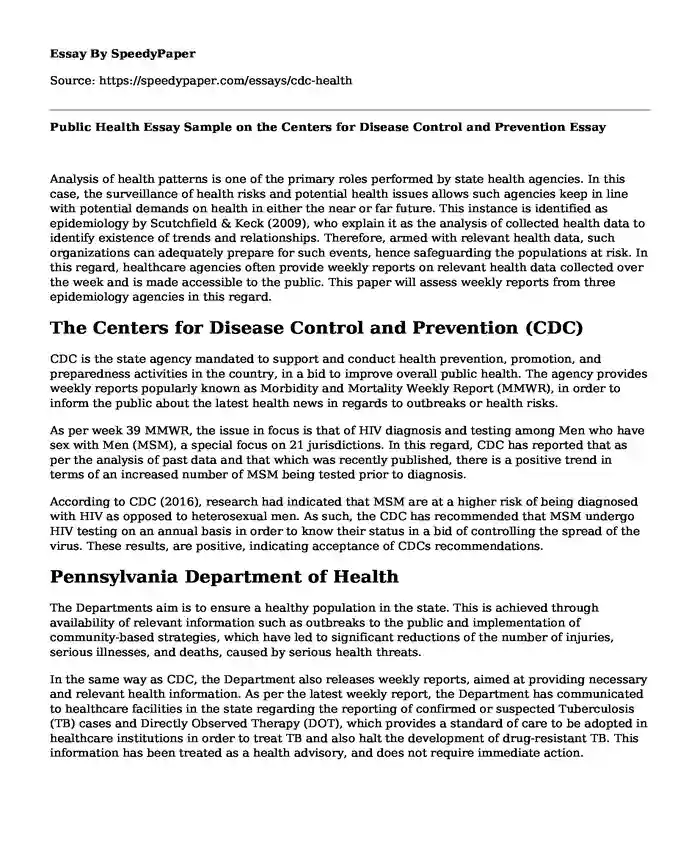
| Type of paper: | Essay |
| Categories: | Public health |
| Pages: | 3 |
| Wordcount: | 667 words |
Analysis of health patterns is one of the primary roles performed by state health agencies. In this case, the surveillance of health risks and potential health issues allows such agencies keep in line with potential demands on health in either the near or far future. This instance is identified as epidemiology by Scutchfield & Keck (2009), who explain it as the analysis of collected health data to identify existence of trends and relationships. Therefore, armed with relevant health data, such organizations can adequately prepare for such events, hence safeguarding the populations at risk. In this regard, healthcare agencies often provide weekly reports on relevant health data collected over the week and is made accessible to the public. This paper will assess weekly reports from three epidemiology agencies in this regard.
The Centers for Disease Control and Prevention (CDC)
CDC is the state agency mandated to support and conduct health prevention, promotion, and preparedness activities in the country, in a bid to improve overall public health. The agency provides weekly reports popularly known as Morbidity and Mortality Weekly Report (MMWR), in order to inform the public about the latest health news in regards to outbreaks or health risks.
As per week 39 MMWR, the issue in focus is that of HIV diagnosis and testing among Men who have sex with Men (MSM), a special focus on 21 jurisdictions. In this regard, CDC has reported that as per the analysis of past data and that which was recently published, there is a positive trend in terms of an increased number of MSM being tested prior to diagnosis.
According to CDC (2016), research had indicated that MSM are at a higher risk of being diagnosed with HIV as opposed to heterosexual men. As such, the CDC has recommended that MSM undergo HIV testing on an annual basis in order to know their status in a bid of controlling the spread of the virus. These results, are positive, indicating acceptance of CDCs recommendations.
Pennsylvania Department of Health
The Departments aim is to ensure a healthy population in the state. This is achieved through availability of relevant information such as outbreaks to the public and implementation of community-based strategies, which have led to significant reductions of the number of injuries, serious illnesses, and deaths, caused by serious health threats.
In the same way as CDC, the Department also releases weekly reports, aimed at providing necessary and relevant health information. As per the latest weekly report, the Department has communicated to healthcare facilities in the state regarding the reporting of confirmed or suspected Tuberculosis (TB) cases and Directly Observed Therapy (DOT), which provides a standard of care to be adopted in healthcare institutions in order to treat TB and also halt the development of drug-resistant TB. This information has been treated as a health advisory, and does not require immediate action.
World Health Organization (WHO)
The WHO is an international agency part of the United Nations and which focuses on international public health. As in the case of the above agencies, WHO publishes weekly epidemiology reports, known as Weekly Epidemiology Records (WER). This approach allows WHO disseminate epidemiological information on outbreak of diseases.
In this regard, the topic under WER focus is cholera. The report discusses data collected in different regions pertaining to cholera cases as captured by national surveillance cases (WHO, 2016). Additionally, the report also discusses patterns of outbreaks and transmission in all continents.
References
Centers for Disease Control and Prevention (2016). Morbidity and Mortality Weekly Report. Retrieved from http://www.cdc.gov/mmwr/volumes/65/wr/mm6537a3.htm?s_cid=mm6537a3_w
Pennsylvania Department of Health (2016). Tuberculosis reporting requirements and Directly Observed Therapy as the standard of care. Retrieved from http://www.health.pa.gov/Your-Department-of-Health/Offices%20and%20Bureaus/epidemiology/Documents/PA%20HAN/2016/2016-PAHAN-%20354-9-28_TB.pdf
Scutchfield, F, D, & Keck, C. W. (2009). Principles of Public Health Practice (3rd Ed.). Clifton Park, NY: Delmar/Cengage Publishing.
World Health Organization (2016). Weekly Epidemiological Record. Retrieved from http://apps.who.int/iris/bitstream/10665/250142/1/WER9138.pdf
Cite this page
Public Health Essay Sample on the Centers for Disease Control and Prevention. (2019, Nov 07). Retrieved from https://speedypaper.com/essays/cdc-health
Request Removal
If you are the original author of this essay and no longer wish to have it published on the SpeedyPaper website, please click below to request its removal:
- Free Essay: Life History of Sigmund Freud
- Free Essay Example on Discovery and Dialogue
- School Violence
- Free Essay on How Social Media and Other Technologies Influences How We Worm Identities
- Essay Sample on the Top Censored Stories of 2007 and 2008: Violation of Local and Foreign Human Rights
- Essay Sample on Vaccination for Children
- Free Essay Example - Management Psychology and HRM
Popular categories




